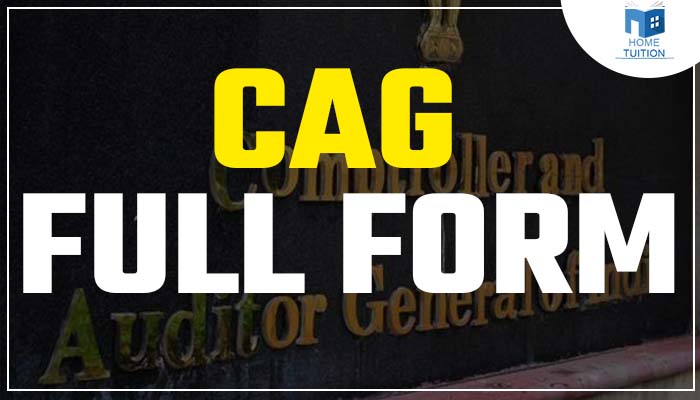Full form of CAG
The full form of the CAG is the Comptroller and Auditor General of India. It is an authority established under the Article 148 of the Constitution of India. Its primary function is to control all government-funded expenditures of the Central Government, State Government, and organizations. Its headquarters are located in New Delhi, India.
In India's order of precedence, the CAG is ranked ninth and has the same status as a Supreme Court of India judge. The CAG is the head of the accounts department and Indian Audit department. He is one of India's foremost investigators of financial frauds, including the coal mine allocation scam and the 2G spectrum allocation scam. On the recommendation of the Prime Minister, CAG is appointed by the President of India.
Powers of CAG
Following the Companies Act 1956, the CAG is allowed to:
- Appointing and reappointing the auditor of a government firm
- Directing the inspection of a government company’s accounts
- Provide auditors with guidance on all audit-relevant matters.
- Perform a test inspection of the accounts
- Supplement to the statutory auditors’ audit report.

Tasks of CAG
Following are the leading roles of CAG as defined by Parliament & the Constitution:
- Audit of expenditure accounts from the Indian Consolidated Fund and the Consolidated Fund of each State and Union Territory
- Audit of accounts relating to contingency fund spending and the public account of India and every state.
- Audit the revenue and payments of federal or state taxes funded by government organizations and companies.
- To send the state accounts audit report to the Governor.
- To send the center accounts audit report to the President.
- Audit the balance sheets, trade, production and profits, losses, or any other account of any central or state government department.
Constitutional Provisions Regarding CAG
- Article 148: It deals with the appointment of CAG and oath as well as conditions of service.
- Article 149: It deals with the duties and the powers of the Comptroller and the Auditor General of India.
- Article 150: Accounts of the State and Central Governments shall be administered as directed by the President and prescribed by the CAG.
- Article 151: It states that all reports of the CAG which will concern the union government will be submitted to the President of India. The President will present them before each chamber of Parliament: lower and upper.
- Article 279: Computation of 'net income to be done by CAG of India. It will be certified by him, and this certification will be final.
- Third Schedule: The Third Schedule of the Constitution of the India prescribes the oath of the Judges of the Supreme Court and the Auditor General at the time of assumption of office.
| Auditor-General of India (1860-1950) | |||
|---|---|---|---|
| No. | Auditor General of India | Tenure began | Year tenure ended |
| 1 | Edmund Drummond | 1860 | 1862 |
| 2 | R. P. Harrison | 1862 | 1867 |
| 3 | E. F. Harrison | 1867 | 1879 |
| 4 | W. Waterfield | 1879 | 1881 |
| 5 | James Westland | 1881 | 1889 |
| 6 | E. Gay | 1889 | 1891 |
| 7 | S. Jacob | 1891 | 1898 |
| 8 | Arthur Frederick Cox | 1898 | 1906 |
| 9 | O. J. Barrow | 1906 | 1910 |
| 10 | Robert Woodburn Gillan | 1910 | 1912 |
| 11 | Sir Frederic Gauntlett | 1912 | 1914 |
| 12 | Sir R. A. Gamble | 1914 | 1918 |
| 13 | Sir Frederic Gauntlett | 1918 | 1929 |
| 14 | Sir Ernest Burdon | 1929 | 1940 |
| 15 | Sir Alexander Cameron Bandedoch | 1940 | 1945 |
| 16 | Sir Bertie Monro Staig | 1945 | 1948 |
| 17 | V. Narahari Rao | 1948 | 1950 |
| Comptroller and Auditor General of India (1950–present) | |||
| No. | Comptroller and Auditor General of India | Tenure Began | Tenure Ended |
| 1 | V. Narahari Rao | 1950 | 1954 |
| 2 | Anil Kumar Chanda | 1954 | 1960 |
| 3 | A. K. Roy | 1960 | 1966 |
| 4 | S. Ranganathan | 1966 | 1972 |
| 5 | A. Bakshi | 1972 | 1978 |
| 6 | Gyan Prakash | 1978 | 1984 |
| 7 | Tirlok Nath Chaturvedi | 1984 | 1990 |
| 8 | C. G. Somiah | 1990 | 1996 |
| 9 | V. K. Shunglu | 1996 | 2002 |
| 10 | Vijayendra Nath Kaul | 2002 | 2008 |
| 11 | Vinod Rai | 2008 | 2013 |
| 12 | Shashi Kant Sharma | 2013 | 2017 |
| 13 | Rajiv Mehrishi | 2017 | 2020 |
| 14 | Girish Chandra Murmu | 2020 | Incumbent |